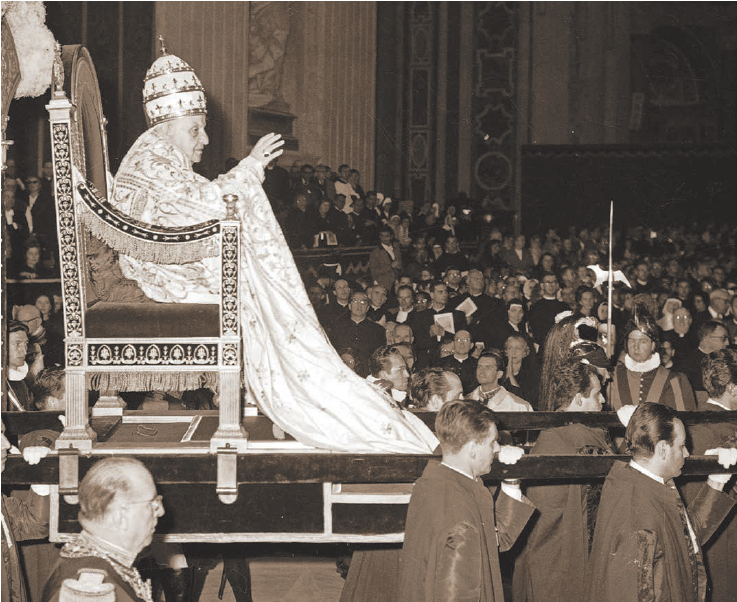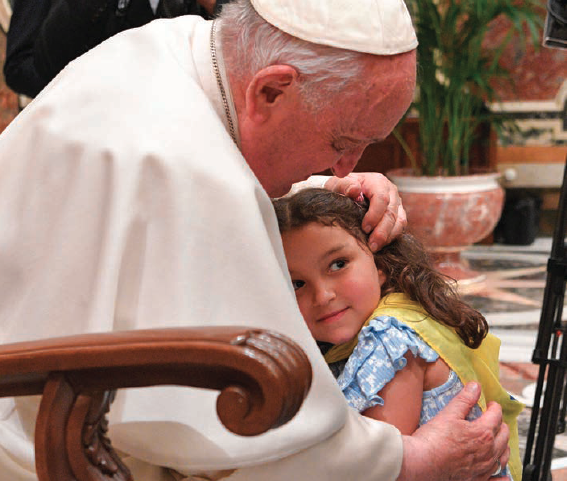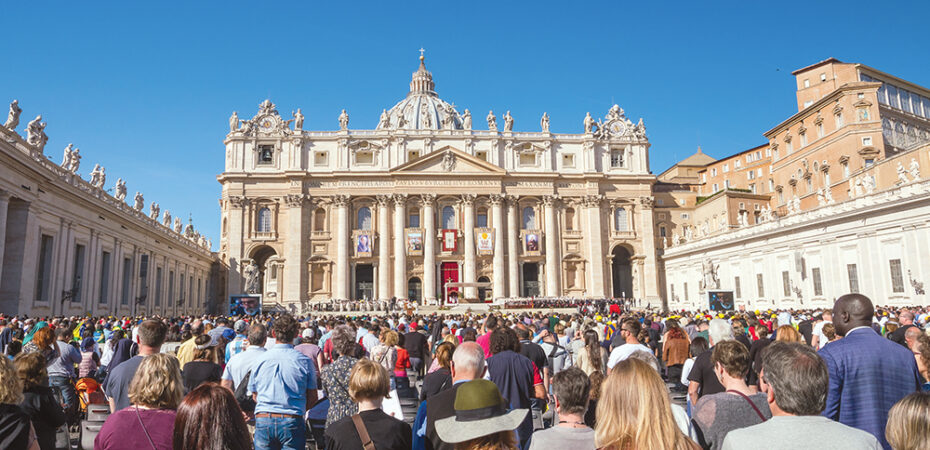A Future Diaconate
How deacons will respond to pastoral needs and build the Church community
Deacon Anthony Gooley Comments Off on A Future Diaconate
The Second Vatican Council sought to restore the permanent ministry of deacon to the life of the Catholic Church and to address a grave pastoral need. Vatican II imagined something new would emerge. Something that would transform the Church’s missionary drive and renew its culture. A new way of being a deacon.
A study of the intentions of the council by the International Theological Commission (ITC) in “From the Diakonia of Christ to the Diakonia of the Apostles,” published in 2002, suggested three primary intentions, in the following order: First, recognition that in the Catholic faith, the threefold order is divinely established as a gift of the Holy Spirit to the Church. The second, to respond to the grave pastoral needs of communities, not merely peripheral needs. The third motivation was to recognize the diaconal ministry furnishes the Church with grace for building up the community for mission. In sum, two of the three intentions concerned matters of faith and doctrine, and one was pastoral.

Shortage of Deacons
The ITC study emphasized that the decision to restore the permanent ministry of deacon was not because of a shortage of presbyters (priests). Rather, there was an acute shortage of deacons. Vatican II hoped to “initiate a clarification of the identity of the priest (presbyter), who did not need to fulfill all of the tasks necessary for the life of the Church,” according to the study. The ITC noted that “Vatican II enabled the Church to go beyond a narrowly sacerdotal [priestly] understanding of the ordained minister.” The diaconate made it possible to conceive of clerical life, the sacred hierarchy and ministry in the Church beyond the category of priesthood.
The council did not appeal to Acts 6:1-7, the story of the seven chosen for ministry among the Greek-speaking communities. This may have been because the word diaconos (deacon) does not appear in the text, although words from the diacon group are found there. It was St. Irenaeus, in the second century, who called them diaconoi (deacons).
In the late 19th century, a German Lutheran pastor established a lay ministry of women and men to serve the needs of the poor. These women and men maintained a distinctive dress and common life, and were in some way parallel to Catholic religious such as the Sisters of Mercy or the Marist Brothers. Pastor Theodor Fliedner called the men deacons and the women deaconesses and linked his ministry to his interpretation of Acts 6.
…………………………………………………………………………………………………………………………………………………
Read More
An expanded version of the ideas featured in this article may be found in Deacon Anthony Gooley’s book, “Deacons Today: New Wine & New Wineskins” (Coventry Press, $23.95).
……………………………………………………………………………………………………………………………………………………
Protestant theologian Wilhelm Brandt was a chaplain to this “deacon house” movement and worked on a theological dictionary of the New Testament. When he came to the diacon word group, he did not base his definition on the research of ancient Greek usage, but rather his experience of the deacon-house movement. He invented a definition that suggested the diacon word group, including diaconos, designated lowly and humble service for the poor, or lowly servants. Thus humble service and servant became identified with the word group and deacons.
His definition influenced others when the word diacon and its variants were encountered, which led to a trajectory so powerful that translators of the Bible tried to align translations with the dictionary definition. When translators came to Acts 6, they began to add words like food or funds as the source of the complaint of the Greeks about the neglect of widows. Neither food nor funds are found in any Greek manuscript of Acts 6, and they do not appear in any translations of the text until the 1940s.
Acts 6 is a powerful story, with relevance for the future ministry of deacons. What transpires is that the Greek-speaking community complains to the Aramaic-speaking community that their widows are neglected in the daily diaconia. The apostles ask them to choose from among their own Greek community of men who will address this neglect. The apostles lay hands on these seven as a sign of their participation in the apostolic ministry. To underscore this as a ministry of evangelization, we hear how two of the seven preach, catechize and baptize.
Philip is simply known as “the evangelist” (Acts 21:8). In other words, the emerging Church needed to respond to a new pastoral situation with a new way of ensuring that all who have a right to hear the Gospel of Christ can hear it, and they chose the seven for this ministry.
The Future
What has all of this to say about the future of the diaconate? I want to suggest that many deacons are assigned to a pastoral support role in a parish that in some way mirrors that of the presbyter/priest. It may be good and necessary work, but it is still closely tied to the definition of priestly ministry that Vatican II was trying to expand. Others are closely identified with ministries of care and concern modeled on the Lutheran deacon-house concern for the poor and marginalized. All of which is good and necessary. Neither, however, are essential to the “something new” that Vatican II thought might emerge. It was trying to respond to the grave pastoral needs of our day.
We live in a culture in which many women and men are neglected in the daily diakonia of the word. Like the early Christian community, we need to find creative ways in which to respond to the need.
Deacons can be a key part of that creative response if we have pastoral imagination and a commitment of resources to envisage a different way of ministering. The potential for diaconal placement is almost endless. Perhaps we need to consider full-time remunerated placements to ensure that we have deacons who can respond adequately to needs. We need the boldness of Evangelii Gaudium: “I dream of a ‘missionary option,’ that is, a missionary impulse capable of transforming everything, so that the Church’s customs, ways of doing things, times and schedules, language and structures can be suitably channeled for the evangelization of today’s world rather than for her self-preservation” (No. 27).
The future diaconate requires careful and creative discernment and pastoral planning in a mission-oriented Church that seeks to go out of itself and proclaim the Gospel. Restoration of the ministry of deacons was identified as the third highest priority by the bishops at Vatican II.
That desire was kindled by the conversations in deacon circles, mostly in Germany during and after World War II. The grave pastoral problem was that so-called Christian Europe had in the space of two generations plunged the world into the misery of war and genocide. A fresh proclamation of the Gospel was needed if a more humane society was to emerge. Today, secularism has created an existential vacuum, men and women are lost, and they need to hear and be formed in the Gospel of Mercy to bring them home.
DEACON ANTHONY GOOLEY lives in Sydney and is a deacon of the Archdiocese of Brisbane, Australia. His ministry includes working on mission and identity formation in Catholic healthcare and aged-care settings.
………………………………………………………………………………………………………………………………………………………

Ministers of the Church of God
Tracing the origins of the diaconate, we read in the Basic Norms for the Formation of Permanent Deacons a joint declaration from the Vatican’s Congregation for Education and Congregation for the Clergy: “From its outset, patristic literature witnesses to this hierarchical and ministerial structure in the Church, which includes the diaconate. St. Ignatius of Antioch considers a Church without bishop, priest or deacon, unthinkable. He underlines that the ministry of deacons is nothing other than ‘the ministry of Jesus Christ, who was with the Father before time began and who appeared at the end of time.’ They are not deacons of food and drink but ministers of the Church of God. The Didascalia Apostolorum, the Fathers of subsequent centuries, the various councils as well as ecclesiastical praxis all confirm the continuity and development of this revealed datum” (No. 2).
……………………………………………………………………………………………………………………………………………………





